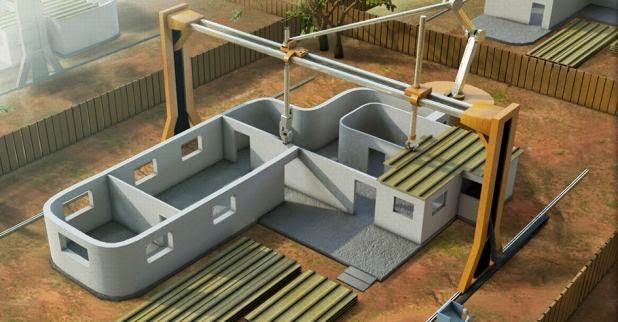Has anyone here actually seen any of these house printers in use in real life?

Has anyone here actually seen any of these house printers in use in real life?

That would be cool but many people will lose out on there jobs.
@John_Mousseau_Tolk3 When car was invented lot of people taking care of people horses lose their jobs…The same happen with other changes. I now…transitions are not easy, but look at architects…we have no job (at least in Spain) because the industry is obsolete and the only chance to success is to reinvent ourselves…
Not job loss. New skill set. Builders become printer operators.
Your right, humans evolve
Progress and change will always kill jobs as it creates new ones. Those who fight change are destined to be left behind. Embrace the change and evolve with the collective. If you do this, you should be fine. Unfortunately there will always be people who get left behind through no fault of their own, but it’s a small minority and it is the price of progress. In the end, this phenomenon affects less and less people.
The ultimate result is all of us “out of jobs” with everything provided for us for free by the Sun transformed into the things we need via automated systems. We may be far from that, but we are a good step up from toiling all day in the fields just for survival. On the continuum from one to the other is a gradual reduction in labor needed from each of us and the reduction in prices of the things we need. That is, if we can keep government from sabotaging this process.
I don’t think it would kill jobs at all, those jobs may change in scope but they will still be there. The equipment will still need to be setup, calibrated and maintained and production materials staged for use by the machine so general laborers will still be needed.
Electricians and plumbers will still need to be on site, even if these machines can do the job – the job still needs to be inspected (prior to a state inspector coming in). Different states and even counties have different building codes which will requires someone versed in a given field to still at least layout the job plan. The list goes on.
a comparable industry would be the oil industry. We have come leaps and bounds a head technologically in this way to drill/frac for oil. A lot has become automated even, but the human need is still there. There are thousands of jobs in the oil industry today even.
This brings up a very interesting topic. How fast is too fast when talking about progress and maintaining economic stability and an inclusive work force. I’ll have to think on it for awhile.
@Steve_Petersen Think about…it’s not an easy question to answer…indeed I guess that there is not a good answer found yet. My personal position is that perhaps human kind can progress when all new recent technology becomes almost perfectly optimized (think about that bulbs that never fail or old Russian freezers that keep running 70 years later, the interior bulb included). If I translate this in a plain and not deep concept I get the smartphone modern problem: instead selling new phones every months with new features, just try to improve actual models until some very reasonable optimization point is reached (batteries running for a week, screens that never broke with normal use,…). When that point is reached, jump to the next one.
My point is: try to keep your energy focused on improving what you have (to don’t spend energy in the future in that problems) and progress when you get a reasonable and optimized solution. Ex.: Why to spend energy and money in new bulbs if it’s perfectly possible to fabricate bulbs that last for centuries?
Yeah… The problem is that most people involved are more into financial gains than progressing humanity. Unfortunately, after the engineers make something, the corporate types exploit it and commission the next “great thing”. This is not a sustainable model and we are all paying the price for this greed.
@Angel_Linares_Garcia A good example to your point is nuclear power. Had we made it with energy in mind and not weapons, we would have used thorium instead. Now we are deep in the uranium hole and nobody seems to see a way out that makes the money men and warmongers happy.
@Steve_Petersen Greed is one of our very best tools for improving the world when money is a reward for providing value to others. Greed is mainly a problem when the greedy can turn guns on others to steal from them or coerce them, including when the power to regulate (ie the use of government guns) is used to distort the market.
I don’t think 3D printers, or “house printers” will ever be able to do everything at once. Structurally, they’ll save a lot of effort, but I don’t think you’ll be able to make a house and “print” the electrical cabling and plumbing into it as you go. Of course, printing technology may surprise me in the future.
Printing a house is cool and much faster than using builders to build it… I look forward to printing my own one if I’m lucky. Hang on… it’s not about luck. It’s about when I’m going to get one.
Have you ever heard of a pick and place machine?
I have seen this thing at work on Discovery Science channel. Though not yet building a complete house.